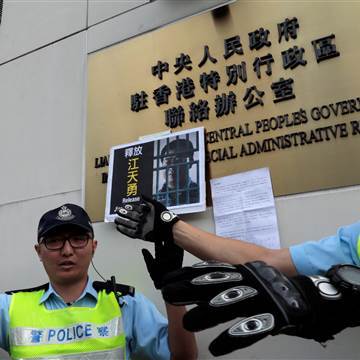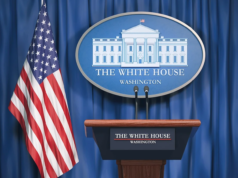China’s state-run media outlets appear to have been inspired by President Donald Trump’s outspoken Twitter posts and attacks on the media.
The People’s Daily, the official newspaper of China’s ruling Communist Party, early Friday tweeted about allegations that a human rights lawyer detained in the country had been tortured in custody.
Its use of language would be familiar to anyone who follows the president on Twitter.
Trump deploys a distinctive style online, with all-caps accusations about “fake news” being a recurring motif in his feed.
In addition to his frequent mentions of “fake news,” Trump has a penchant for all capitalized words. He also frequently ends tweets with an exclamation point, or a single word or short phrase of analysis or commentary, such as “Sad!” or “Lies!”
Now Trump’s “fake news” trope now appears to have been adopted by Chinese state media for their own ends.
The story which the People’s Daily was at pains to refute concerns Xie Yang, a human rights lawyer who was detained by Chinese authorities in Hunan province in July 2015.
Several international media outlets, including the New York Times, Wall Street Journal, Britain’s Guardian newspaper and Japan’s Asahi Shimbun have carried reports suggesting that authorities tortured him in order to force the lawyer to sign a confession.
Chinese state media launched a concerted push-back against the allegations this week.
The Global Times newspaper on Thursday published an article featuring comments from Jiang Tianyong, a former lawyer who once represented Xie. Jiang was quoted as saying that he fabricated the allegations of torture to cater to the “taste of Western media.”


The papers alleged this was a bid to discredit the Chinese government.
In addition, the state-run Xinhua news agency published a story denouncing what it called the “imagination-based torture stories” about Xie’s mistreatment as “cleverly orchestrated lies,” and, of course, “fake news.”
To complete the state media full-court-press, the People’s Daily newspaper carried a report Friday, highlighting the story from the Global Times, and alleging that medical checks showed Xie to be in good health.
Experts suggest that the term “fake news” has percolated into Chinese state media’s lexicon is no coincidence.
“Any failure of the United States to uphold its own standards [of press freedom] emboldens dictators and despots to restrict the media in their own countries”
“Although mainland Chinese mainstream media always accuse Western media coverage of China’s human rights record and cases as biased, it’s very rare to see them use the term ‘fake news’ to describe Western media reports,” Patrick Poon, a China researcher at Amnesty International, told NBC News in an email. “Some party publications might have used the term but it’s just very rare in mainstream media.”
Poon added: “As Donald Trump has been discrediting some major Western media reports as ‘fake news,’ it seems that the mainland mainstream media might be borrowing this term from him to attack Western media coverage of human rights cases in China.”
Whether the embrace of a Trump-ism by China’s authoritarian government is of any wider significance, or is just a linguistic curiosity, remains to be seen.
However, organizations that champion press freedom in the U.S. have warned that any erosion of press freedoms in America would have an impact for journalists around the world.
“Any failure of the United States to uphold its own standards [of press freedom] emboldens dictators and despots to restrict the media in their own countries,” Sandra Mims Rowe, chairman of the Committee to Protect Journalists, said in a statement issued prior to last year’s election.







